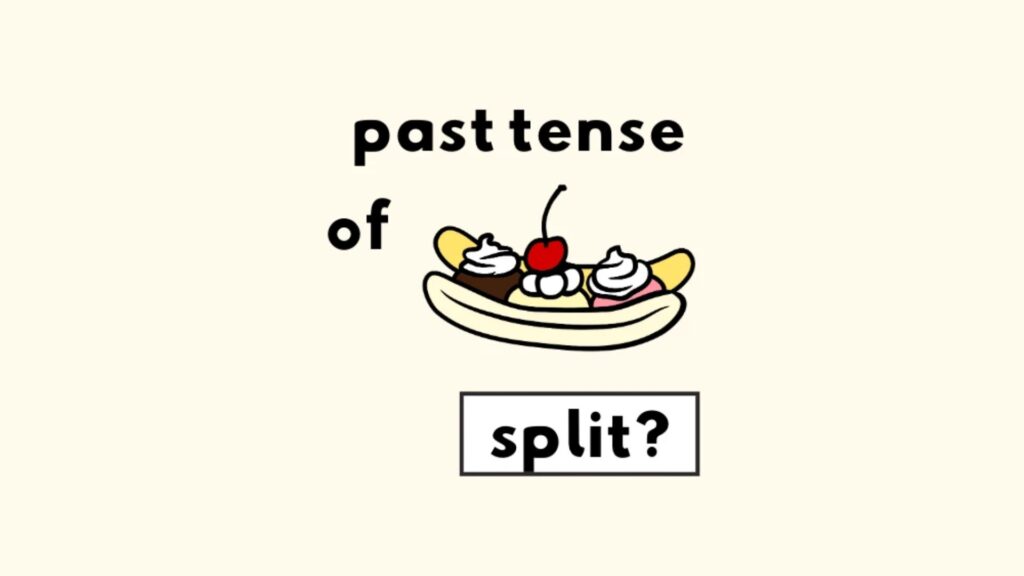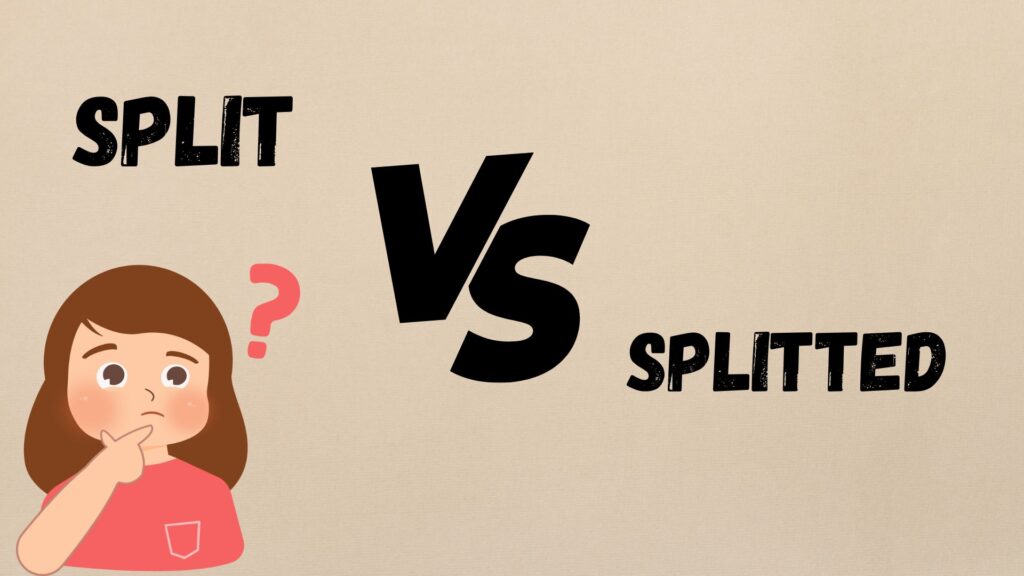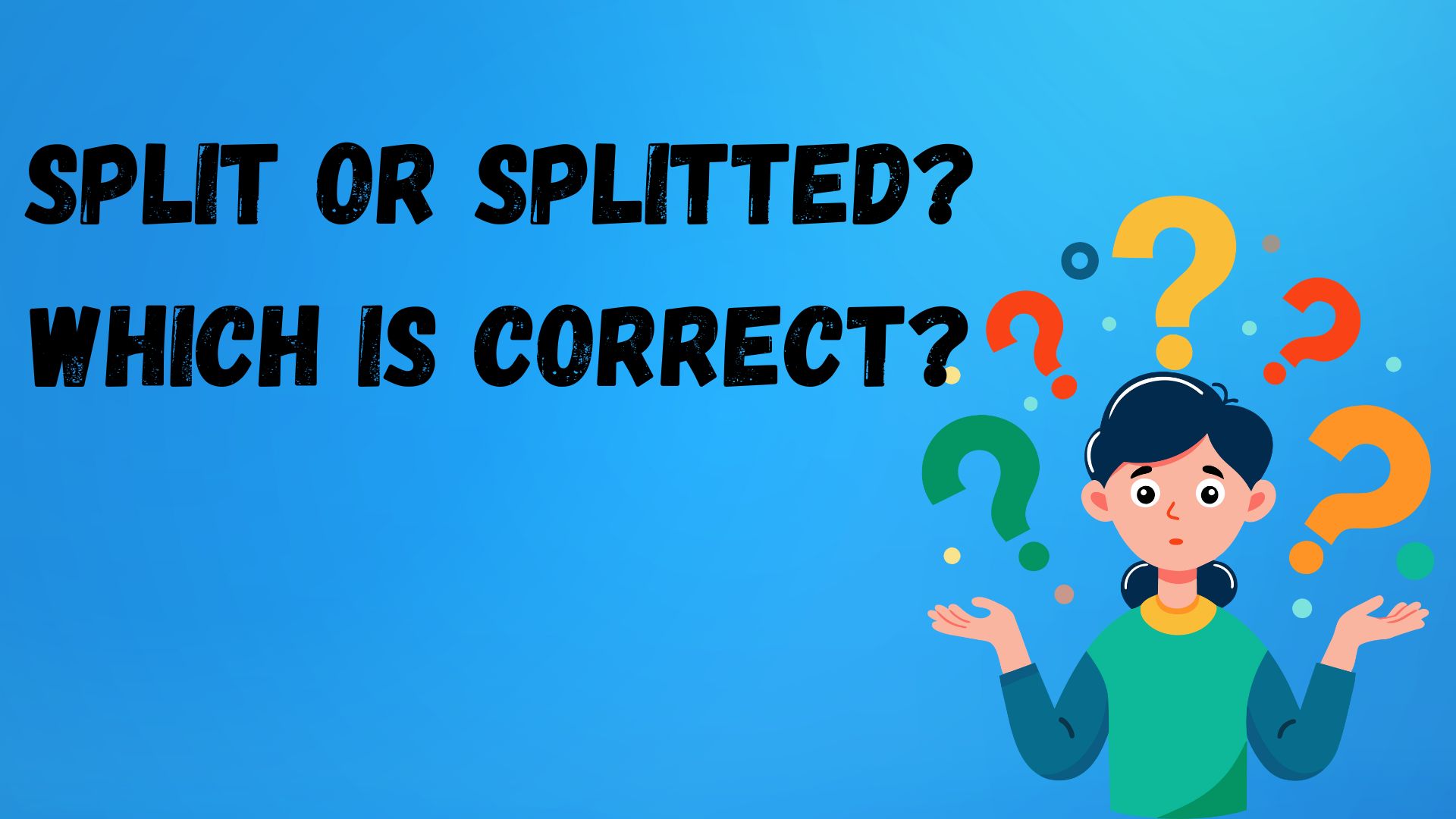Split or Splitted
Understanding the Confusion: “Split” vs. “Splitted”

Ever found yourself typing out a sentence like “He splitted the bill with me” and paused, wondering if that’s even a word?
You’re not alone.
The past tense of “split” can be a bit confusing. That’s because it’s an irregular verb, and its forms don’t follow the usual “-ed” rule. So let’s clear things up right away:
✅ The correct past tense and past participle of split is… split.
❌ Splitted is not standard in modern English usage.
But don’t just take our word for it let’s break it down with examples, grammar insights, and a few fun idioms along the way.
Why “Split” Is an Irregular Verb
In English, most regular verbs form their past tense by adding -ed (walk → walked, jump → jumped). But irregular verbs don’t play by those rules.
Split is one of those rule-breakers. Just like:
- Hit → hit
- Bet → bet
- Set → set
- Shut → shut
- Burst → burst
You’ll notice all of these stay the same in every tense present, past, and past participle.
So when you’re saying:
- Present: I split the wood.
- Past: I split the wood yesterday.
- Present perfect: I have split the wood already.
The word “split” never changes.
But Is “Splitted” Ever Right?
Technically, “splitted” did exist in older forms of English. In some Low German, Middle Dutch, or Proto-Germanic roots, variations like “splitted” were occasionally found. You’ll also see it pop up in dated texts or regional dialects.
However, in standard modern English, using “splitted” is considered incorrect.
❌ Incorrect: “She splitted her time between two jobs.”
✅ Correct: “She split her time between two jobs.”
Even tools like Grammarflex and most grammar checkers will flag “splitted” as an error.
Let’s See It in Action: Scenario-Based Examples

Split or Splitted
📧 Example 1 – Work Email
Subject: Team Budget Allocation
Hey Nicole,
Just wanted to confirm we split the budget evenly between the two departments, as discussed last Friday.
Let me know if there are any concerns.
Best,
Jared
Using “splitted” in this professional email would not only sound wrong it could make the sender seem less polished.
🛠️ Example 2 – Text Message Between Friends
Lexi: Did you pay for lunch today?
Jordan: Nah, we split it 50/50.Lexi: Perfect! Thanks.
Again, “split” is the correct past tense form here. Even in casual texts, “splitted” would feel jarring.
Breaking Down the Verb Conjugation
Let’s take a look at the full verb conjugation of split for clarity:
| Tense | Form of “Split” | Example Sentence |
|---|---|---|
| Present Simple | split / splits | They split the rent every month. |
| Past Simple | split | We split the check last night. |
| Present Perfect | has/have split | I have split my time between two jobs. |
| Past Perfect | had split | He had split his focus before the meeting. |
| Future | will split | She will split the prize money. |
| Present Continuous | am/is/are splitting | They are splitting the profits now. |
| Past Continuous | was/were splitting | We were splitting tasks all afternoon. |
| Present Perfect Continuous | has/have been splitting | I’ve been splitting my schedule lately. |
Notice how “split” doesn’t change form for simple past or perfect tenses? That’s key to mastering its use.
Is “Split” Transitive or Intransitive?
Split can be both transitive and intransitive, depending on how it’s used.
🔹 Transitive verb (has an object):
“He split the log in half.”
🔹 Intransitive verb (no object needed):
“The road split near the intersection.”
Understanding the difference helps you use the verb more precisely, especially in perfect tenses or continuous tenses.
Split Idioms and Phrases You Should Know
English is full of colorful expressions using “split.” These idioms enrich everyday conversation and writing.
- “Split down the middle” – divided evenly
The board was split down the middle on the decision. - “Split in two” – broken apart
The vase split in two when it hit the floor. - “Split the difference” – compromise between two amounts
You want $20, I want $10. Let’s split the difference at $15. - “Make like a banana and split” – a humorous way to say “leave quickly”
This party’s boring. Let’s make like a banana and split! - “Lickety-split” – very fast
He finished his homework lickety-split. - “Don’t let the door hit you where the good Lord split you” – a blunt way to tell someone to leave
You’re quitting? Don’t let the door hit you where the good Lord split you. - “Finer than a frog’s hair split four ways” – extremely fine or delicate (mostly Southern US slang)
She was dressed finer than a frog’s hair split four ways.
Common Mistakes: Split vs. Splitted

Let’s be honest “splitted” looks like it should be right, especially if you’re applying regular verb rules. But here’s a quick cheat sheet:
| Sentence | Correct or Not? |
|---|---|
| I splitted my sandwich with her. | ❌ Incorrect |
| I split my sandwich with her. | ✅ Correct |
| He has splitted his duties. | ❌ Incorrect |
| He has split his duties. | ✅ Correct |
Final Takeaway: How to Conjugate “Split” Properly
When in doubt, remember:
- Split is an irregular verb.
- Its past tense and past participle are the same as its base form.
- “Splitted” is never correct in modern standard English.
And if you’re still unsure, just check with grammarflex or a reputable grammar source. Most tools will correct “splitted” instantly.
Wrap-Up: Grammar Help for Irregular Verbs
The verb split might seem simple, but it carries complexity because of its unchanging form across tenses. Unlike most verbs that rely on -ed endings, split stays the same whether you’re using present, past, perfect, or future tense.
If you’re diving into English grammar tips or struggling with verb conjugation, it helps to make a list of verbs that don’t change, like burst, set, and hit.
Learning these patterns will boost your confidence and help you sound more fluent in both written and spoken English.
📝 Need a Quick Grammar Tip?
Bookmark this rule:
If you’re tempted to say “splitted,” split it instead. 😉

